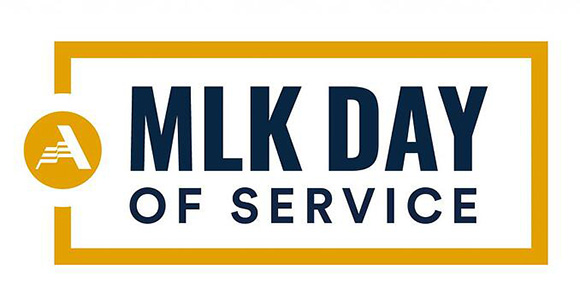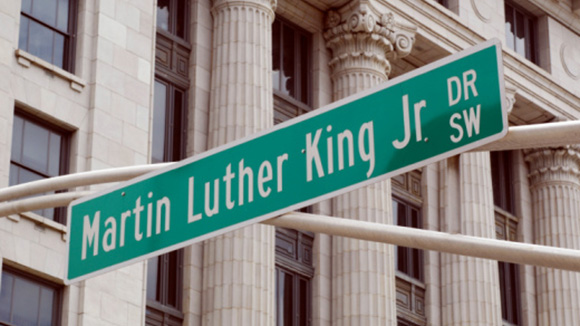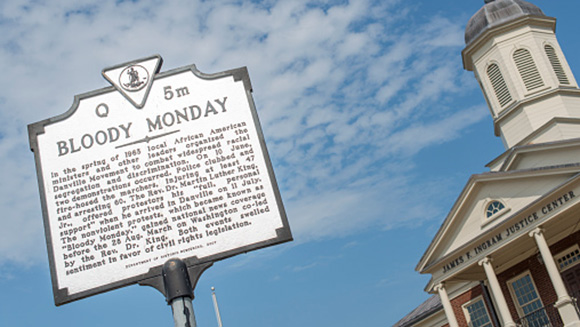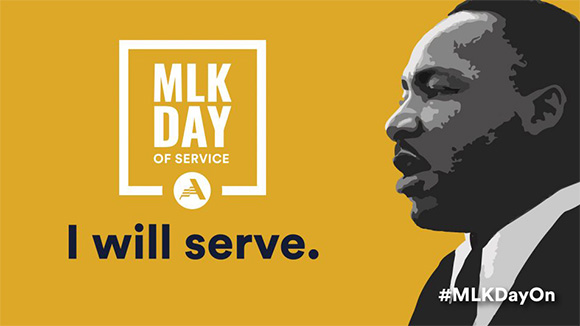MLK Day is an opportunity for reflection & work, “a day on, not a day off.” Let’s start by celebrating King & his writing.

Image courtesy of AmeriCorps
If the year 2020 has taught us anything, and it has probably taught a great many things, it is that participating civically in our democracy, which at around 244 years old is still fairly young, is of the utmost importance. Martin Luther King Jr. did all that and more.
He led the Montgomery Bus Boycott, helped establish the Southern Christian Leadership Conference with fellow ministers, marched on Washington, marched in Selma, was awarded the Nobel Peace Prize, and was instrumental in passing the Civil Rights Act of 1964 and the Voting Rights Act in 1965. He had more plans, more inspirational and determined wisdom to give (especially on economic justice), but was assassinated in Memphis, Tennessee, in 1968.
For much of the 20th century only Black and Brown Americans, for example, King himself, Rosa Parks, Cesar Chavez, as well as a multi-ethnic coalition of students and liberals understood the value of participating by protest (peacefully and not riotously), an aspect of what John Lewis termed “good trouble.”
Protesting, activism, making one’s voice heard, are paramount in all democracies, and can be dangerous. It is not a coincidence that the storming of the Capitol took place just a day after Georgia’s historic senate race, which resulted in the first Black senator of a southern state ever. That senator-elect, Raphael Warnock, happens to be the pastor at Ebenezer Baptist Church, where MLK himself preached from 1960 until his murder in 1968.
In public discourse since his death, King’s words have become somewhat diluted and sanitized, mostly by those who fail to grasp how truly revolutionary he and his actions were. In this blog, I’ll be picking a few of my favorite King quotes in order to more fully appreciate his legacy. Then, you’ll find a trio of films that delve into and explore Black lives in the mid-1960s Civil Rights era. All are worth a viewing, two viewings, ten viewings, a thousand viewings.
Explore Amiercan History @ Coastline
Quotes
“We know through painful experience that freedom is never voluntarily given by the oppressor; it must be demanded by the oppressed. Frankly, I have yet to engage in a direct action campaign that was ‘well-timed’ in the view of those who have not suffered unduly from the disease of segregation. For years now I have heard the word ‘Wait!’ It rings in the ear of every Negro with piercing familiarity. This ‘Wait’ has almost always meant ‘Never.’ We must come to see, with one of our distinguished jurists, that ‘justice too long delayed is justice denied.’”
-Martin Luther King Jr., “Letter from a Birmingham Jail”
This is a snippet partway through King’s “Letter from a Birmingham Jail” in which King writes to fellow ministers and pastors about the importance of civil disobedience, of following “just laws” and breaking, or shining a light on, the “unjust” ones.

Getty Images
“To save man from the morass of propaganda, in my opinion, is one of the chief aims of education. Education must enable one to sift and weigh evidence, to discern the true from the false, the real from the unreal, and the facts from the fiction."
-Martin Luther King Jr., “The Purpose of Education”
An extremely timely piece from King’s “The Purpose of Education,” which was an article he published while he attended Morehouse College in the late 1940s. But King goes further by saying that “intelligence is not enough,” going on to add that “Intelligence plus character—that is the goal of true education.”
For college students everywhere this should be at the top of their priorities list; we need students (and educators) who think and speak rationally, logically, truthfully, and who are engaged in the betterment of themselves and, more importantly, their peers and the world around them; that’s where ‘character’ comes in.

Getty Images
“I believe that wounded justice, lying prostrate on the blood-flowing streets of our nations, can be lifted from this dust of shame to reign supreme among the children of men. I have the audacity to believe that peoples everywhere can have three meals a day for their bodies, education, and culture for their minds, and dignity, equality, and freedom for their spirits. I believe that what self-centered men have torn down men other-centered can build up.”
-Martin Luther King Jr., Nobel Prize Acceptance Speech
The above quote comes from King’s Nobel Peace Prize acceptance speech. In the speech, King recognizes that his (and other Civil Rights’ leaders’ work) is not yet finished, that the project of peace and justice that engaged him and many others remained ongoing, and remains ongoing to this day.
I picked it for that reason. King’s acknowledgment of work-unfinished should serve as an acknowledgment for us all of work-unfinished. There are wrongs to be righted, mouths to feed, people to free, laws to enact, laws to repeal, and much more besides. The work takes time, passion, and patience, but it will be worth it, as King knew and attested to many times over.

Getty Images
The Edmund Pettus Bridge in Selma, Alabama was the scene of violent clashes as Martin Luther King, Jr. led a march from Selma to Motgomery.
A Trio of Civil Rights-Focused Films
Selma (2014, dir. Ava DuVernay) – A wrenching portrait of the 1965 march from Selma to Montgomery, Alabama that King helped lead and organize. The film also depicts the illegal COINTELPRO surveillance operation carried out by law enforcement against King and other civil rights and leftist leaders. For further exploration on the FBI’s relationship with King, check out a new documentary by Sam Pollard, MLK/FBI.
I Am Not Your Negro (2016, dir. Raoul Peck) – This documentary is made up of footage of writer James Baldwin with narrations by Samuel L. Jackson from Baldwin’s unpublished manuscript Remember This House about his friendships and experiences with three Civil Rights icons who were all assassinated: Medgar Evers, Malcolm X, & Martin Luther King Jr.
Malcolm X (1992, dir. Spike Lee) – A biopic about the other Civil Rights icon most people remember besides King; Malcolm X was more controversial, but should be rightly celebrated as a complex and moral leader. Denzel Washington gives an unrelenting performance and Spike Lee directs with assuredness and poise, two of his calling cards.
BONUS: One Night in Miami (2020, dir. Regina King) – This film had a limited theatrical release last year, and released January 15 on Amazon. It tells a fictional story of a conversation between icons Muhammad Ali (then still known as Cassius Clay), Malcolm X, Sam Cooke, and Jim Brown. The film is written by Kemp Powers (and based on his play of the same name) and is Regina King‘s feature directorial debut. So far it’s gotten rave reviews.

Courtesy of AmeriCorps
Wrappin’ It Up
In a speech entitled “Beyond Vietnam,” delivered on April 4, 1967, at Riverside Church, King put it thusly: “Every man of humane convictions must decide on the protest that best suits his convictions, but we must all protest.” Activism, protest, voting are all ways of making one’s voice not just heard but recognized in the pursuit of justice and liberty for all. Martin Luther King understood that better than anyone.